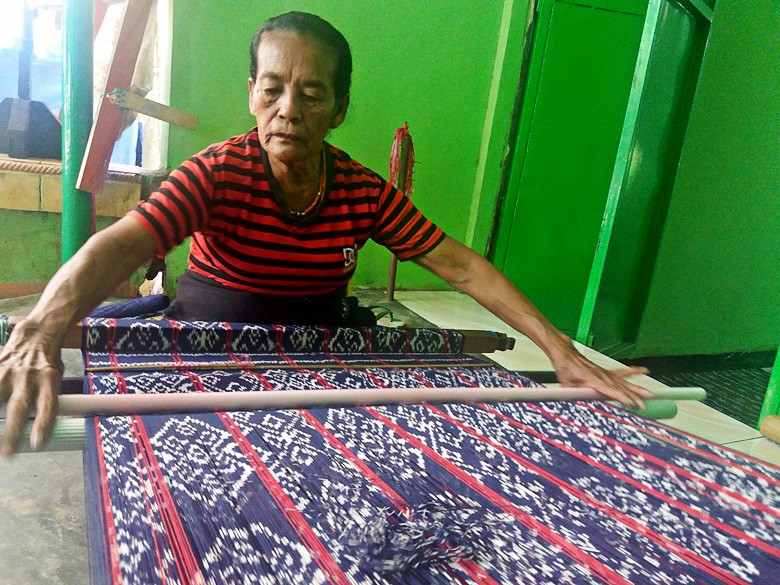Popular Reads
Top Results
Can't find what you're looking for?
View all search resultsPopular Reads
Top Results
Can't find what you're looking for?
View all search resultsNew handwoven textiles school to open in Kupang
The University of Nusa Cendana (Undana) in Kupang, East Nusa Tenggara, is set to open a study program on tenun ikat (handwoven fabric), starting from the 2016 academic year.
Change text size
Gift Premium Articles
to Anyone
 Preserving culture – A member of the Ina Sabu handwoven fabric workshop in Oepura subdistrict, Kupang, East Nusa Tenggara, makes traditional sabu fabric on March 2. She can complete a piece of handwoven fabric within a week and sells the pieces for Rp 300,000 (US$23) each. (thejakartapost.com/Djemi Amnifu)
Preserving culture – A member of the Ina Sabu handwoven fabric workshop in Oepura subdistrict, Kupang, East Nusa Tenggara, makes traditional sabu fabric on March 2. She can complete a piece of handwoven fabric within a week and sells the pieces for Rp 300,000 (US$23) each. (thejakartapost.com/Djemi Amnifu)
T
he University of Nusa Cendana (Undana) in Kupang, East Nusa Tenggara, is set to open a study program on tenun ikat (handwoven fabric), starting from the 2016 academic year. The program is relatively new for Indonesia and will be offered by the university’s School of Science and Technology as a three-year diploma.
“Because this is a vocational study program, there will be a combination of science and [practical] skills offered in the program. Maybe the transfer of skills will be the larger portion of the program. This year we have started enrolling new students,” Undana’s assistant rector for academics, David Pandie, told thejakartapost.com in Kupang last week.
David said Undana would cooperate with tenun ikat workshops in Kupang to enable students to practice their skills. It is also expected that Undana students will conduct special research on the development of locally made handwoven textiles in the future.
Once legalized by the Research and Technology and Higher Education Ministry, David said, Undana would introduce the study program to the public, with local administrations as a focal point, to ensure younger generations became interested in learning about traditional textiles.
David said Undana was set to sign a memorandum of understanding with 23 regencies and municipalities across East Nusa Tenggara, through which the enrolment of students could be specifically targeted, unlike other programs.
He said the diversity of woven textiles in East Nusa Tenggara illustrated the geographical differences in the province. “Such a diverse collection of East Nusa Tenggara’s traditional woven textiles can become the province’s identity and this study program could become a competitive advantage for Undana,” said David.
The East Nusa Tenggara administration’s head of trade and industry, Bruno Kupok, said the study program on woven textiles was the result of cooperation between the provincial administration, the Industry Ministry and Undana.
He added that the province’s woven textiles were rich in both motifs and patterns, so they needed to be preserved and improved, particularly in terms of quality.
“Concerning this reality, we decided to build a university study program that specially focuses on our woven fabric. We want to make sure our cultural heritage will not disappear and we can work to improve the quality of our woven fabric products so they can compete with other products,” said Bruno.
He said it was expected that through the program, problems affecting the production of handmade textiles could be resolved through science and technology. To realize the transfer of skills, Undana has recruited lecturers including woven textile practitioners and fabric experts from the Bandung Textile Technology Polytechnic and the Industry Ministry.
“The presence of this study program will not affect philosophical values contained in our locally made handwoven textiles. What we want to do is improve the quality of woven textiles from East Nusa Tenggara, for example related to the thickness and coloring process of the textiles, which can affect their quality. These problems can be resolved with technology,” said Bruno.
He said students of the new diploma would be recruited based on cooperation between the provincial, regency and municipal administrations. “We hope those students can pursue their study with financial support from their local administration and after completing their study, they can return to their respective hometowns,” said Bruno. (ebf)









